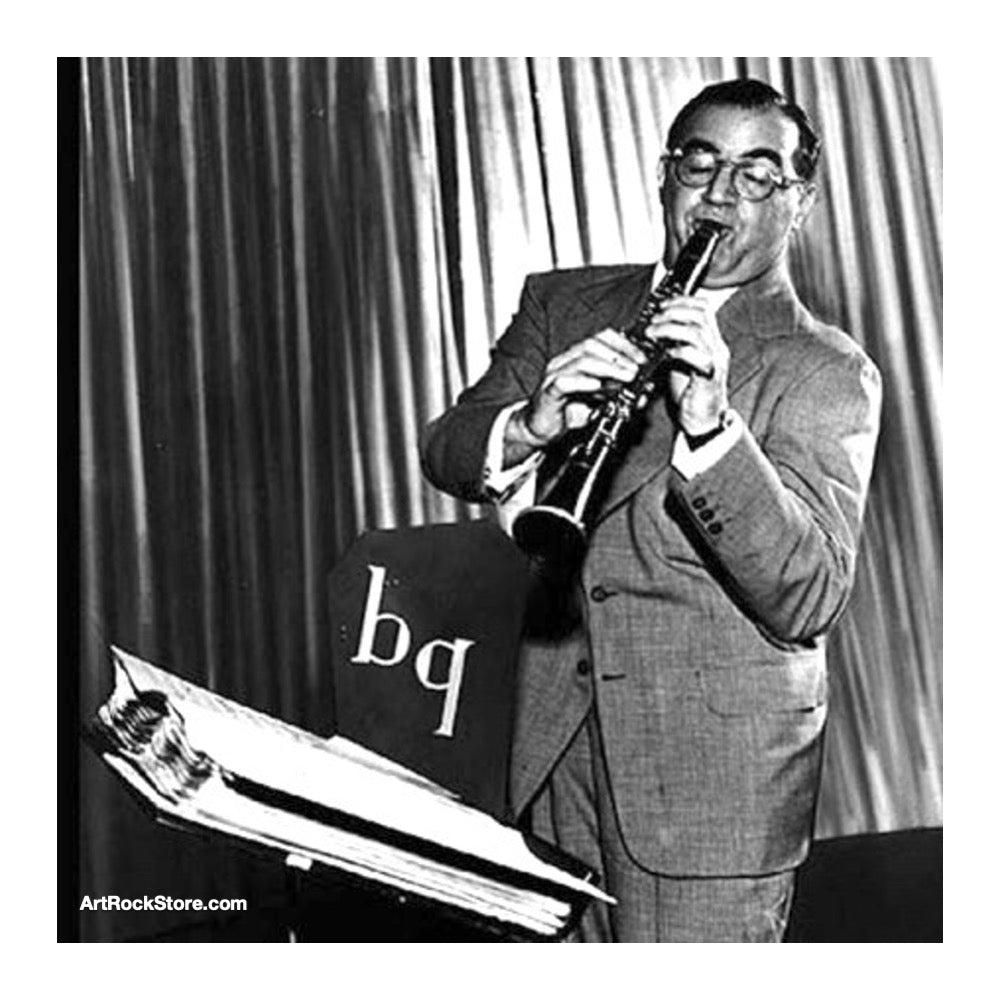
Benny Goodman | Artist
Benjamin David 'Benny' Goodman was an American clarinetist and bandleader born 1909 in Chicago, Illinois. Known as the "King of Swing", Goodman's Orchestra and Sextet did phenomenally well commercially. From 1936 to the mid-40s, Goodman led one of the most popular swing big bands in the US. His concert at Carnegie Hall in New York City on January 16, 1938, is described by critic Bruce Eder as "the single most important jazz or popular music concert in history: jazz's 'coming out' party to the world of 'respectable' music." Goodman was undoubtedly an important link in the development of Jazz as a popular music form. Goodman was born the ninth of twelve children to poor Jewish emigrants from the Russian Empire. They settled in Chicago's Maxwell Street neighborhood, an overcrowded slum near railroad yards and factories populated by Jewish immigrants. Believing that music might be a ticket out of poverty for his sons, Goodman’s father enrolled the ten-year-old in free music classes at the Kehelah Jacob Synagogue. Benny got a clarinet and two years of clarinet lessons from the clarinetist and Chicago Symphony Orchestra member, Franz Schoepp. He made his professional debut in 1921 at the Central Park Theater, and entered Harrison Technical High School in Chicago in 1922. At fourteen he became a member of the musicians' union and worked in a band featuring Bix Beiderbecke. Two years later, in 1926, he joined the Ben Pollack Orchestra. His first recording was the song "When I First Met Mary", which also included Glenn Miller. In a Victor recording session in 1928, he played alongside Miller, Tommy Dorsey, and Joe Venuti in the All-Star Orchestra. He played with the bands of Red Nichols, Ben Selvin, Ted Lewis, and Isham Jones and recorded for Brunswick under the name Benny Goodman's Boys, a band that featured Glenn Miller. In 1928, Goodman and Miller wrote "Room 1411", Miller's first known composition. He reached the charts for the first time in January 1931 with "He's Not Worth Your Tears", featuring a vocal by Scrappy Lambert. After signing with Columbia in 1934, he had top ten hits with singers Jack Teagarden, Mildred Bailey, and Billie Holiday. An invitation to play at the Billy Rose Music Hall led to the creation of his orchestra for the engagement. They recorded "Moonglow", which became a number one hit and was followed by the Top Ten hits "Take My Word" and "Bugle Call Rag". NBC then hired Goodman for the radio program Let's Dance, which kicked off the "swing era". During an era of racial segregation, Goodman led one of the first integrated jazz groups. One of these african-American musicians was Charlie Christian, who was a member of Goodman's Sextet from 1939-41, during which time he turned the electric guitar into a popular jazz instrument. In late 1937 Goodman and his band played the prestigeous Carnegie Hall. The sold-out concert on January 16, 1938 is regarded as one of the most significant concerts in jazz history. Jazz had finally been accepted by mainstream audiences. According to Stan Ayeroff, "the concert helped jazz evolve from being strictly dance music to music worthy of a discerning listening audience." It was the start of jazz being recognized as an art form on a par with classical music. Over a Fifty year period Goodman made hundreds of swing and jazz recordings, plus, in later years, classical recordings with luminaries such as Leonard Bernstein, Aaron Copland and Igor Stravinsky. There are many excellent compilations available, in particular the Columbia Records sets Benny Goodman Sextet (1986), The Benny Goodman Sextet Featuring Charlie Christian (1989), and Compositions and Collaborations (1986). Also recommended is the 1950 archival release The Famous 1938 Carnegie Hall Jazz Concert (Complete). The reception of American swing was less enthusiastic in Europe at that time. UK author J.C. Squire filed a complaint with BBC Radio to demand it stop playing Goodman's music, calling it "an awful series of jungle noises which can hearten no man." Germany's Nazi party barred jazz from the radio, claiming it was part of a Jewish conspiracy to destroy the culture. Italy's fascist government banned the broadcast of any music composed or played by Jews which they said threatened "the flower of our race, the youth. Goodman also helped racial integration in America. In the early 1930s, black and white musicians could not play together in most clubs and in the Southern states, racial segregation was enforced by Jim Crow laws. Goodman defiantly hired black musicians Teddy Wilson, Lionel Hampton, and Charlie Christian. According to "Jazz" by Ken Burns, Lionel Hampton states that when someone asked Goodman why he "played with that nigger" (referring to Wilson), Goodman replied, "If you say that again to me, I'll take a clarinet and bust you across your head with it."
Artist Website: wikipedia/Benny_Goodman
Featured Albums: Benny Goodman
Related Artists: Charlie Christian
